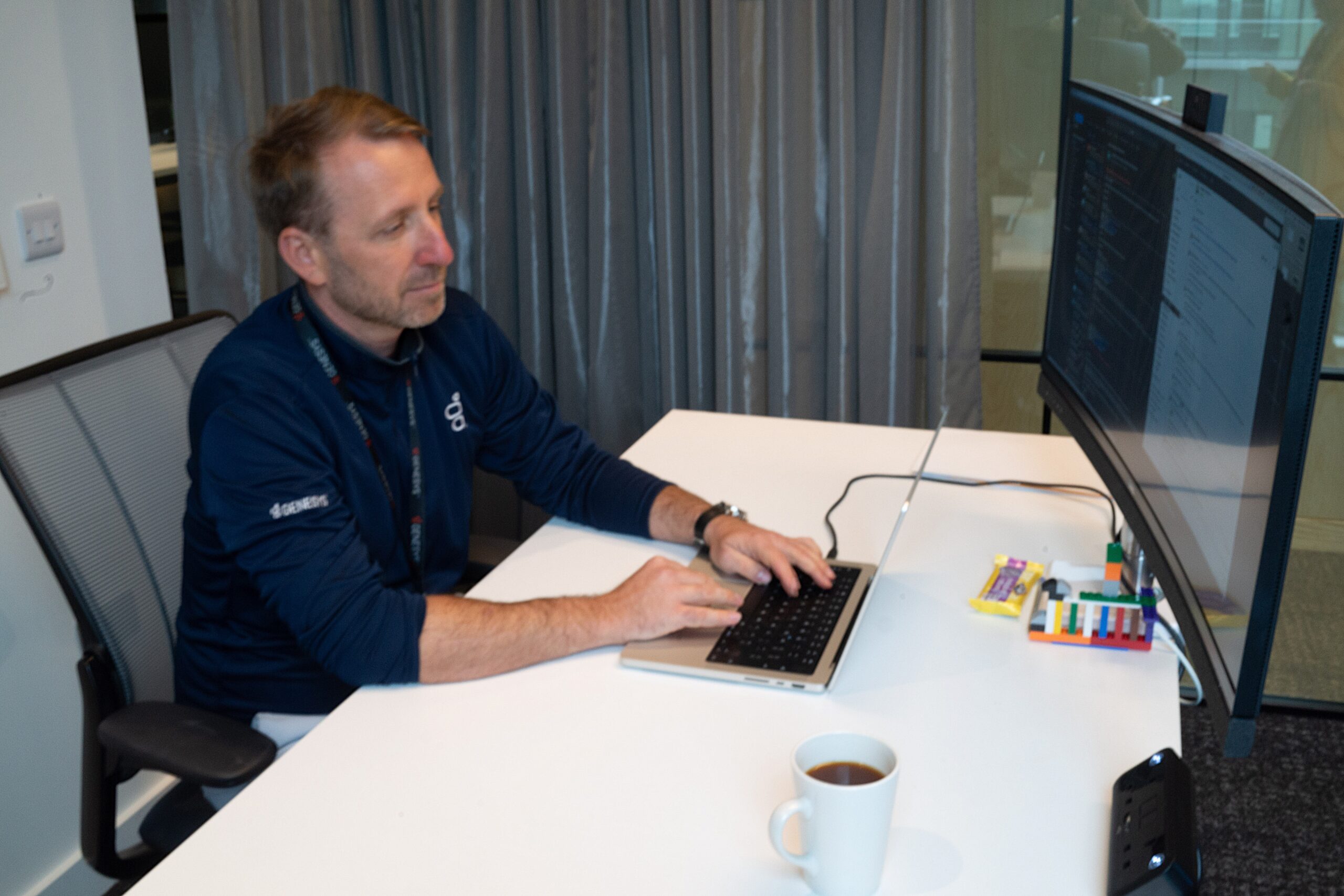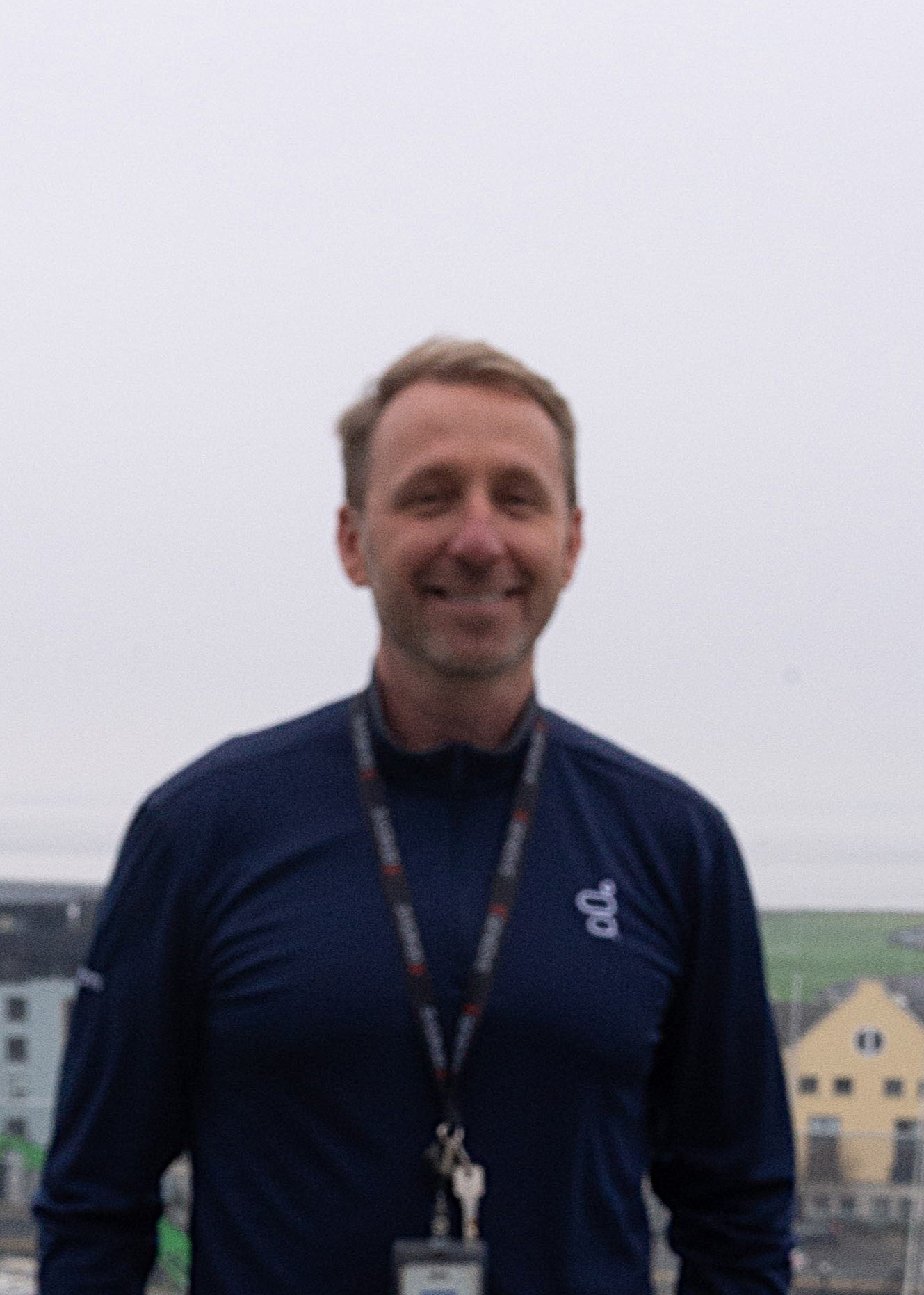
There’s a saying about being at the right place at the right time. For Dr Maciej Dabrowski, attending University of Galway’s Data Science Institute (DSI) – then called Digital Enterprise Research Institute (DERI) – opened unexpected doors.
In this Cois Coiribe article, we explore Dr Dabrowski’s journey from student in Poland to his role as Senior Director of Product Management, Platform at Genesys. We asked him: What part did University of Galway play? His answer: It made my career possible.

Maciej Dabrowski (MD): My name is Maciej Dabrowski, and I am the Senior Director of Product Management, Platform at Genesys. I was previously the Chief Data Scientist at Genesys and Altocloud for approximately 10 years, then about 2 years ago, I moved to product management. In my current role, I am responsible for our data platform and analytics products, ensuring that Genesys AI models can use high-quality data when needed.
Genesys is a global leader in AI-powered customer experience orchestration. More than 8,000 organisations worldwide use our solution to create personalised experiences for their customers and employees. Our product helps resolve customer issues and also increases employee productivity using artificial intelligence. You are likely using our platform when you call your bank with a question about your mortgage, talk to a bot when trying to find out where your package is, or send a social message to an airline because your flight was delayed. This set of experiences is what we call a customer journey, and it is a source of really valuable data about an individual’s needs, situation or the problem they are facing. Building a platform that can collect and curate relevant data so it can help agents resolve problems faster in a more personalised manner, with the assistance of AI, is what my job is about.
Genesys is a relatively large company that employs over 6,000 people around the world. The site in Galway was set up in 2018, after the acquisition of a start-up called Altocloud, and it now employs over 400 people in Ireland. We are fortunate to be part of a very thriving local ecosystem, partnering with University of Galway through research projects, thesis supervision, or internship grants.
MD: I came to Ireland around 18 years ago to do a PhD. I’m a Computer Science graduate from Poland, and I studied both computer science and business and economics there. During my final year, one of my housemates had travelled to Ireland for an internship. When he came back, he said, “Maciej, you always talked about doing a PhD; I went to this institute in Galway that is doing very interesting research, you should have a look at their programmes.”
He was talking about the Data Science Institute at University of Galway – back then called DERI.
I looked into it and found it very interesting. After a round of interviews, my PhD journey began. At the time, I knew very little about Ireland, having never been to the country before. Nevertheless, I packed my suitcase and flew into Shannon Airport. When I arrived in Galway, the sun was shining, the city looked stunning, and I really liked it.
The beginnings were tough, as I had to first find my footing in a new country and fully understand what line of research I wanted to pursue. After a few months, I found my research topic at the intersection of computer science and Artificial Intelligence, and I tied it with an aspect of psychology and human decision-making. My PhD research was conducted between DERI and the J.E. Cairnes School of Business and Economics; my supervisor, Tom Acton, who did an amazing job mentoring me throughout my PhD, was from the latter. To give the gist of the topic, I worked on building new AI algorithms that work for, and with, people to ensure they make better decisions. My research focused on applications of AI in online commerce, known as recommender systems, ensuring that customers can discover and purchase products that are not only more suitable, but also objectively good – great deals.
It was a truly an amazing time, and I did a lot of interesting work. I also made many life-long friendships with the amazing people who came to do research at DERI from all over the world. Heading into my PhD viva voce, most of my time was spent writing. After it was all done, I thought to myself: What next?
I still remember sitting down, contemplating what I wanted to do after my PhD. One evening, I decided to set up my Twitter (now X) account. The first tweet I saw was a job posting for a Postdoc at DERI, working on Social Networks with Alex Passant and Professor John Breslin. It was a great fit; I got the job and started my next chapter working as a Postdoc at DERI for two more years. I had a lot of fun, but eventually, there came a time when I decided to look for industry opportunities. This was another occasion where University of Galway shaped my future and career. It was through DERI’s work with industry that I met my future boss and mentor, Joe Smyth, Senior Vice President of R&D for Digital & AI at Genesys.
My memories of my first encounter with him are vivid. Over coffee, Joe told me he was building a start-up, and that it was in stealth-mode, that the business would use AI to change the future of customer journey analytics. He offered me an opportunity to join the team and lead the AI and data function, and that is how I became the Chief Data Scientist at Altocloud, a company led by Barry O’Sullivan, who held the role of CEO, and who is also popularly known as one of the dragons on the show Dragons’ Den.
Long story short, we had an amazing team and culture, we worked super hard – and had fun along the way – and we went on an exciting start-up journey that included being the first tenants of Galway Portershed. The business grew, and we were acquired by Genesys in 2018. I then became the Chief Data Scientist for Genesys, and now Genesys Ireland employs more than 400 people across the country. We are part of a huge global business, and here the fun continues.
To make this point very clear, without University of Galway, and without that PhD, I would not be where I am right now. Credit is due to the type of research I’ve been able to do, but also to the people and the connections that followed. It made this career possible and, really, made Galway the new home for my family.
MD: Yes. I noticed a niche when observing early iterations of recommender systems such as Amazon. While building more accurate algorithms makes sense, end customers don’t care about model accuracy; they want to make better product purchasing decisions in a more subjective and objective sense.
There’s a whole area of science called Decision Science, focused on understanding how our brains work when we are making all kinds of decisions. Picking a coffee, for example, has a very low cost of making a mistake, while other choices, like buying a car, have a much more lasting, larger impact; we approach them differently.
My work merged the new AI algorithms with human decision-making strategies. Take, for example, buying a car: you might have some criteria in mind, like a budget of up to €15,000, certain mileage, and a particular brand. However, there may be a car that has slightly higher mileage, but it also has additional features, like a better stereo, leather seats or adaptive cruise control. Using a traditional website, you may never see those options, as the cars will be filtered based on your initial, fixed criteria. Alternatively, the AI model will say: this car does not fully meet the criteria you used, but it is a very optimal choice; how do you feel about relaxing your constraints and choosing this slightly more expensive car with more features? It adds that missing element of a “value for money” standpoint. This is how technology and AI are working with the human element of things. It’s not that novel now, but 15 years ago that concept was in its infancy, worth a PhD.
MD: Current widespread application of AI definitely creates the need for AI ethics and governance, which is also recognised by both private and public sectors through various AI regulations, like the EU AI Act. At Genesys, we recognised this a couple of years ago, and this is when we took steps to truly understand those risks and mitigate them. For example, we have an AI working group spanning privacy, legal, compliance, security and product functions that focuses on AI ethics and compliance, as well as our in-house data anonymisation frameworks. We are also partnering with University of Galway and working closely on new ways to detect bias in AI models, or to design better tools to catalogue data used by AI in complex data ecosystems. This is a rapidly evolving domain that will shape how AI technology is applied, and we are yet to see how it affects our daily lives.
MD: Yes. I think it’s a fantastic space that offers interesting work with a huge impact. Generative AI technologies, like ChatGPT, truly democratised AI, as you don’t need to be an engineer or a data scientist to use these capabilities. You can instead just talk to an AI agent using natural language.
I think that there are a couple of different types of opportunities in AI nowadays. The work on new, ground-breaking generative AI models, like Language Learning Models (LLMs), requires an unbelievable amount of financial and technological resources, very few companies can afford that. Most modern AI jobs are focused on building products that use both traditional and generative AI. For that, you need programming skills and an understanding of scalability challenges, coupled with a good understanding of how to use generative AI models through concepts like prompting. Finally, the rapid growth of generative AI led to an explosion of opportunity in the AI ethics and compliance domain, and I expect this trend to continue.
My advice to students is that AI is here to stay, so no matter what line of work you choose, you will be using or building it. There is a shift toward using AI to be more effective for humans, integrating it into the workflow and workforce as a tool to amplify efficiency within a given task or tasks, so it is definitely beneficial to understand a bit more about AI so you can better benefit from it.
Profiles

Dr Maciej Dabrowski, Senior Director of Product Management, Platform at Genesys, is a University of Galway alumnus. He conducted PhD research between the Data Science Institute (formerly Digital Enterprise Research Institute) and the J.E. Cairnes School of Business and Economics. He later went on to complete a Postdoc with the University and the Institute, focusing on Social Networks and Knowledge Graphs. Formerly the Chief Data Scientist for the startup Altocloud, which was later acquired by Genesys, he continued in this role at Genesys before moving into his current position in Product Management. With a background in engineering, business, and decision support systems, Dr Dabrowski is passionate about building products that create value with AI and data.